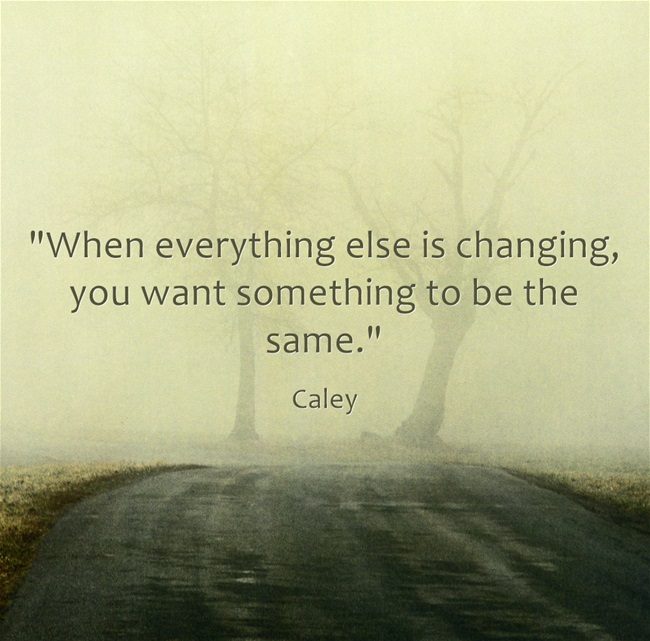Lately, though, we’ve been eating at the restaurant not only out of sensory needs, but also out of a need for routine and predictability. After the first three visits there, Caley said eating there became a tradition for her: a routine that she could count on to provide predictability. What’s more, she has ordered the same fish and vegetable dish each time. Today she professed that she would like to try something else, but as that would change her routine, she didn’t feel comfortable doing so. To help her, I ordered something new and let her ‘steal’ a few pieces of sushi from my plate, to eat alongside her fish and vegetable dish.
I asked Caley why she needed routine, and this was her reply. “It’s one less thing for your brain to be worried about. There’s always a lot of stuff you have to deal with. At least with routine there’s something you can control. There’s something that will be the same. And when everything else is changing, you want something to be the same.”
You heard her: routine and predictability are very important to people on the spectrum. Unfortunately, this is a changing world and we can’t always have the same routines. There are several things to do when that becomes an issue. One of these things is giving warnings in advance. Last weekend I was supposed to come visit Caley. I had planned to leave first thing in the morning to go see her, and I told her so. Unfortunately, later that night I discovered that my boyfriend was really sick and he probably had strep throat (which I, thinking I only had a cold, had been the unknowing donor of). I texted Caley and told her that, though I still planned to come visit, it was possible that I may be too unwell to go.
I continued warning her of this possibility the next day as I waited at the walk-in clinic. Lo and behold, the doctor tested me, found I had strep, and strictly warned me not to travel. (I was hard to convince, because I really wanted to go help Caley, so she had to cite the example of Jim Henson, who apparently died of strep complications, before I agreed to rest at home instead of traveling.) I told Caley, and she was understanding and said that having the warning of that possibility really helped her.
Caley is going through a lot of changes right now, which is why she needs more support and why routine wherever she can find it is more important to her than ever. For most people, these changes would be a cause for joy and relief. Today, Caley is getting her first car, a graduation present from our parents and grandparents. And in two weeks, Caley will be graduated from college with a degree in Public Health and a minor in Homeland Security and Emergency Management.
Both of these things Caley has worked very hard to achieve, getting her license and putting in three years of labor towards this degree, and we are all very proud of her. In fact, these changes are seen by many as the ultimate success. Yet, they are still just that: changes. And change can be scary for someone on the spectrum, because change means unpredictability and uncertainty. So, though Caley is happy to be getting a car and graduating, she is still simultaneously frightened of what all these changes in her life mean.
If ordering a different meal in a restaurant is difficult for her, because of change, imagine how she feels going from being a student, her role for almost the entirety of her life previously, to being graduated and looking for employment. In short, it’s terrifying. So finding little bastions of routine and predictability wherever she can is absolutely essential. And having a support system helping her transition to this change is invaluable. Hopefully, after reading this article, you understand a little better how to provide those supports to someone in your own life.
-Creigh

 RSS Feed
RSS Feed
